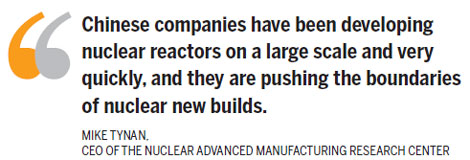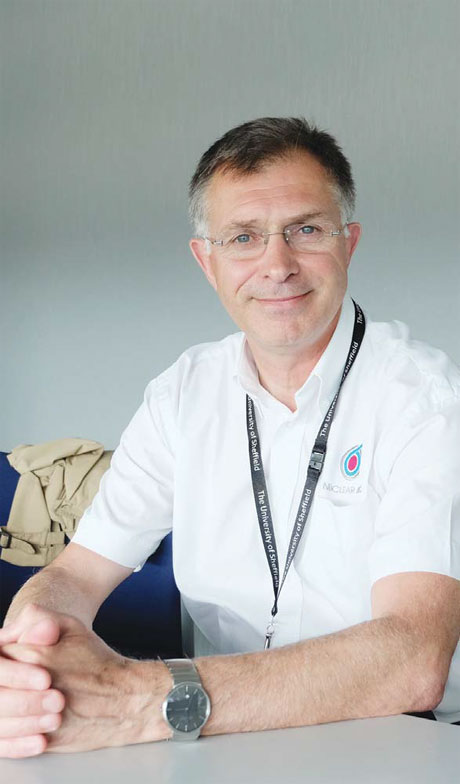Small reactors the smart way to go
By Cecily Liu (China Daily Europe) Updated: 2015-07-10 07:22UK industry veteran would like Chinese companies to share in developing technology in his country
Chinese nuclear-power firms can be good partners for the United Kingdom in developing small, modular nuclear reactors, says Mike Tynan, CEO of the Nuclear Advanced Manufacturing Research Center.
Most of the world's existing nuclear technology is large scale, but Tynan and his team at the Nuclear AMRC believe small, modular nuclear reactors, or SMRs, could be the future of this industry because investment risks are easier to control.
|
Mike Tynan, CEO of the Nuclear Advanced Manufacturing Research Center. Cecily Liu / China Daily |

SMRs are defined by the International Atomic Energy Agency as advanced reactors producing up to 300 megawatts of electric power that can be largely built in factories and shipped to utilities and end users. The nuclear technology currently proposed for UK new projects includes: AP1000 developed by US firm Westinghouse, the European Pressurized Reactor by the French firm Areva and the Advanced Boiling Water Reactor by Hitachi.
Each of these nuclear technologies would be accompanied by a supply chain consisting mainly of companies located in the country where the technology originated. The UK does not currently have indigenous nuclear technology as its nuclear industry history is characterized by foreign investment.
But Tynan believes that the development of a new, UK-originated SMR technology could help exports from the country's nuclear chain and bring financial benefits to the country as joint intellectual property owner of the technology once it is exported.
"Chinese companies have been developing nuclear reactors on a large scale and very quickly, and they are pushing the boundaries of nuclear new builds. As a partner, they would provide tremendous opportunities for our companies to be involved in nuclear new builds," Tynan says.
But Chinese companies are also involved in developing SMRs. China National Nuclear Corporation is adapting AP1000 technology for its ACP100 SMR, with an output of 100 mW of electrical power plus 310 mW of thermal power that can be used in district heating schemes. CNNC is preparing a demonstration site with two units in Fujian province, and also developing a 120 mWe model.
The Nuclear AMRC, led by the University of Sheffield and the University of Manchester, was established in 2009 to help the UK's nuclear industry firms improve their technology through research and development and expertise sharing.
Tynan, who was previously chief executive of Westinghouse UK, came into contact with Chinese nuclear-power companies around 2011 when several expressed an interest in participating in Westinghouse-led AP1000 nuclear technology in the UK.
Although Chinese companies have not yet worked with Westinghouse in the UK, Tynan has maintained the relationship with the Chinese firms that have visited the Nuclear AMRC twice to learn about how it could help Chinese nuclear firms enter the UK market.
He says if Chinese nuclear technology is used in the UK, much of the work building the nuclear reactors will be done in the UK, and the Nuclear AMRC can play a crucial role in helping to incorporate the UK's nuclear supply chain firms into Chinese nuclear technology in the UK.





